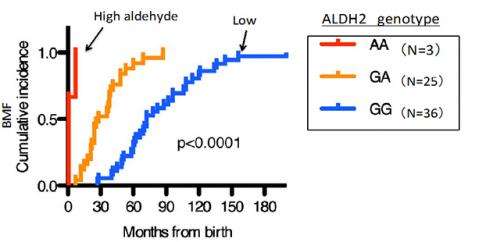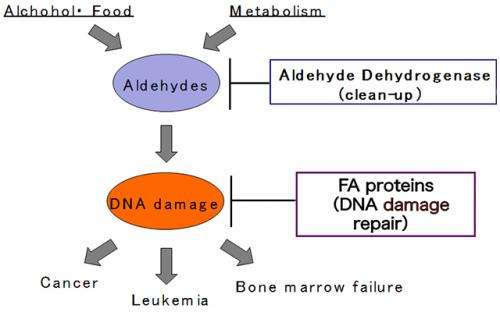Genotyping of Aldehyde dehydrogenase2 (ALDH2) solves the mystery of Fanconi anemia

Kyoto University research group led by Prof. Minoru Takata has found the deleterious impact of the ALDH2 variant genotype in human Fanconi anemia (FA) patients. This finding strongly suggests the important role of endogenous aldehydes in the pathogenesis of FA.
The research group found the defective ALDH2 variant is associated with accelerated progression of bone marrow failure in Japanese FA patients.
The data support the view that aldehydes are an important source of genotoxicity in the human hematopoietic system.
What has been known about Fanconi anemia
Fanconi anemia (FA) is a severe hereditary disorder with progressive bone marrow failure (BMF), developmental abnormalities, and increased occurrence of leukemia and cancer. Parents of FA patients carry one copy of mutated and one copy of the normal FA gene, and FA patients have two mutated copies inherited from the parents. FA is related to hereditary breast and ovarian cancer (HBOC), which recently have gained widespread attention due to the famous actress Ms Angelina Jolie's confession in the New York Times. A subset of FA genes has been reported to cause HBOC.
It is known that the genes defective in FA patients work in fixing damaged DNA, preventing accumulation of broken DNA in our cells. This also means that DNA damage is always happening in our normal body as well as in patients' body. But how that can occur? What is the nature of the DNA damage in the cell? These are the critical questions that have been unanswered until recently.

Recent studies using ALDH2/FA double deficient mice have suggested that the FA proteins might counteract aldehyde-induced genotoxicity in hematopoietic stem cells. They showed that in the absence of the ALDH2 gene, FA model mice displayed much severer phenotype. ALDH2 is an essential enzyme that breaks down aldehydes, hence ALDH2 deficient mice are supposed to have higher levels of aldehydes in their body.
Variant ALDH2 gene in Japan and East Asia
ALDH2 is important in alcohol detoxification as well (Figure 1). Ethanol is first metabolized by alcohol dehydrogenase into acetaldehyde. Acetaldehyde is subsequently metabolized to acetate, mainly by the enzyme ALDH2. Acetaldehyde is known as a mutagen and animal carcinogen that causes DNA damage and promotes cancer. Importantly, acetaldehyde is produced endogenously in our body.
Nearly half of the Japanese population carry a defective variant of the aldehyde-catalyzing enzyme ALDH2. Individuals with the variant allele experience flushing when drinking alcohol, and have an elevated risk of esophageal cancer with habitual drinking. Thus, some Japanese FA patients are expected to have ALDH2 variant gene, providing an opportunity to test the role of aldehyde in human FA patients.
What the research group has found
The research group examined 64 Japanese FA patients, and found that the ALDH2 variant is strongly associated with accelerated progression of bone marrow failure (Figure 1), while birth weight or the number of physical abnormalities was not affected. Moreover, malformations at some specific anatomic locations were observed more frequently in ALDH2-deficient patients.
Thus the research group can say that it is important to clean up endogenous aldehydes and repair DNA damages to keep blood-forming cells in bone marrow in healthy condition (Figure 2). If the FA gene is mutated, aldehyde-induced DNA damage cannot be repaired. Therefore blood-forming stem cells accumulate aldehyde-induced DNA damage, resulting in more severe symptoms of FA.
In conclusion, their current data indicate that endogenous aldehydes may play the key role in the pathogenesis of FA.
Suggestions from our study
- There is a possibility that aldehydes play an important role in other diseases with impaired bone marrow function.
- It seems worth considering ALDH2 agonists as a novel therapeutic drug against symptoms in FA patients.
- It will be interesting and important whether cancer development in the HBOC patients is affected by ALDH2 variant or not.
More information: Asuka Hira, Hiromasa Yabe, Kenichi Yoshida, Yusuke Okuno, Yuichi Shiraishi, Kenichi Chiba, Hiroko Tanaka, Satoru Miyano, Jun Nakamura, Seiji Kojima, Seishi Ogawa, Keitaro Matsuo, Minoru Takata, and Miharu Yabe. "Variant ALDH2 is associated with accelerated progression of bone marrow failure in Japanese Fanconi anemia patients." Blood; published ahead of print September 13, 2013. dx.doi.org/10.1182/blood-2013-06-507962















